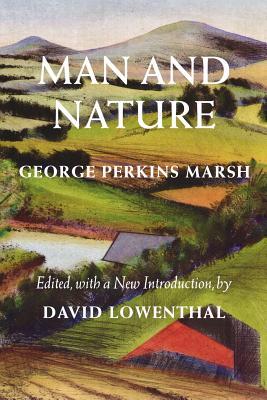In Man and Nature, first published in 1864, polymath scholar and diplomat George Perkins Marsh challenged the general belief that human impact on nature was generally benign or negligible and charged that ancient civilizations of the Mediterranean had brought about their own collapse by their abuse of the environment. By deforesting their hillsides and eroding their soils, they had destroyed the natural fertility that sustained their well-being. Marsh offered his compatriots in the United States a stern warning that the young American republic might repeat these errors of the ancient world if it failed to end its own destructive waste of natural resources. Marsh's ominous warnings inspired conservation and reform. In linking culture with nature, science with history, Man and Nature was the most influential text of its time next to Darwin's On the Origin of Species, published just five years earlier.
In his Introduction to this new edition, David Lowenthal places Man and Nature in the context of recent scholarship and evaluates its significance for the environmental movement that has emerged since the latter part of the twentieth century. He also paints a vivid portrait of the book's brilliant, passionate, wide-ranging, and sometimes choleric author.
Although what we know and what we fear about the environment have vastly amplified since Marsh's day, his appraisal of forest cover and erosion remains largely valid, his cautions about watershed control still cognent, and his call for stewardship ever more pertinent. Man and Nature is worth reading not only for having taught lessons crucial in its day, but for teaching them still so well.

Man and Nature: Or, Physical Geography as Modified by Human Action
In Man and Nature, first published in 1864, polymath scholar and diplomat George Perkins Marsh challenged the general belief that human impact on nature was generally benign or negligible and charged that ancient civilizations of the Mediterranean had brought about their own collapse by their abuse of the environment. By deforesting their hillsides and eroding their soils, they had destroyed the natural fertility that sustained their well-being. Marsh offered his compatriots in the United States a stern warning that the young American republic might repeat these errors of the ancient world if it failed to end its own destructive waste of natural resources. Marsh's ominous warnings inspired conservation and reform. In linking culture with nature, science with history, Man and Nature was the most influential text of its time next to Darwin's On the Origin of Species, published just five years earlier.
In his Introduction to this new edition, David Lowenthal places Man and Nature in the context of recent scholarship and evaluates its significance for the environmental movement that has emerged since the latter part of the twentieth century. He also paints a vivid portrait of the book's brilliant, passionate, wide-ranging, and sometimes choleric author.
Although what we know and what we fear about the environment have vastly amplified since Marsh's day, his appraisal of forest cover and erosion remains largely valid, his cautions about watershed control still cognent, and his call for stewardship ever more pertinent. Man and Nature is worth reading not only for having taught lessons crucial in its day, but for teaching them still so well.